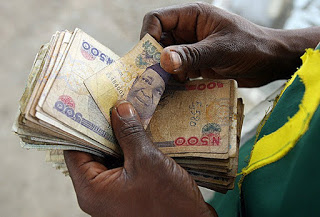Nigeria exited recession in the second quarter, but
the pace of growth was slow despite higher earnings from oil,
suggesting Africa’s largest economy remains fragile and overly dependent
on its dominant export.
the pace of growth was slow despite higher earnings from oil,
suggesting Africa’s largest economy remains fragile and overly dependent
on its dominant export.
Growth was 0.55
percent year-on-year, the statistics office said on Tuesday, while OPEC
data shows crude production rebounded 9.1 percent to 1.68 million
barrels per day over the same period.
percent year-on-year, the statistics office said on Tuesday, while OPEC
data shows crude production rebounded 9.1 percent to 1.68 million
barrels per day over the same period.
But that
GDP expansion was a full percentage point lower than economists polled
by Reuters expected, and the office also said the first-quarter
downturn, at 0.91 percent, had been steeper than initially estimated.
GDP expansion was a full percentage point lower than economists polled
by Reuters expected, and the office also said the first-quarter
downturn, at 0.91 percent, had been steeper than initially estimated.
The
economy shrank by 1.5 percent in 2016, its first annual contraction in a
quarter century, crippled by lower oil revenues following years of
subdued prices and a shortage of hard currency.
economy shrank by 1.5 percent in 2016, its first annual contraction in a
quarter century, crippled by lower oil revenues following years of
subdued prices and a shortage of hard currency.
“This
is not at all a robust GDP print,” said Razia Khan, chief economist for
Africa at Standard Chartered, of Tuesday’s figures.
is not at all a robust GDP print,” said Razia Khan, chief economist for
Africa at Standard Chartered, of Tuesday’s figures.
“It still falls far short of the growth rates the Nigerian economy should be achieving.”
Oil accounts for the bulk of Nigeria’s foreign earnings and government revenue.
But
according to International Monetary Fund figures for 2013 it makes up
no more than a sixth of gross domestic product. The statistics office
says it makes up less than a tenth.
according to International Monetary Fund figures for 2013 it makes up
no more than a sixth of gross domestic product. The statistics office
says it makes up less than a tenth.
The office
said the second quarter GDP contribution from the non-oil sector –
notably agriculture and manufacturing, including textiles, clothing and
footwear – shrank slightly from the previous three months and from the
previous year.
said the second quarter GDP contribution from the non-oil sector –
notably agriculture and manufacturing, including textiles, clothing and
footwear – shrank slightly from the previous three months and from the
previous year.
Nigeria’s government has also
touted agriculture as a way to wean the country off its oil dependence.
Growth there fell to 3.01 percent from 4.53 percent in the second
quarter of 2016.
touted agriculture as a way to wean the country off its oil dependence.
Growth there fell to 3.01 percent from 4.53 percent in the second
quarter of 2016.
“Regardless of growth moving
back into positive territory, it remains fragile,” said Celeste
Fauconnier, a regional economist at Rand Merchant Bank in Johannesburg,
which predicts a full-year expansion of just 0.5 percent.
back into positive territory, it remains fragile,” said Celeste
Fauconnier, a regional economist at Rand Merchant Bank in Johannesburg,
which predicts a full-year expansion of just 0.5 percent.
“An
undiversified production base, a host of structural rigidities and
persistent security troubles point to a prolonged and gradual recovery
period,” said Fauconnier.
undiversified production base, a host of structural rigidities and
persistent security troubles point to a prolonged and gradual recovery
period,” said Fauconnier.
Nigerian crude
production slumped last year as militants attacked oil facilities, with
an average output of 1.54 million barrels a day in the second quarter of
2016, according to OPEC figures.
production slumped last year as militants attacked oil facilities, with
an average output of 1.54 million barrels a day in the second quarter of
2016, according to OPEC figures.
Output rebounded after the
government engaged in negotiations to address communities’ grievances in
its crude-producing heartlands in the Niger Delta.
government engaged in negotiations to address communities’ grievances in
its crude-producing heartlands in the Niger Delta.
Source: Reuters











